 | | | In the wake of mild progress and mixed reviews at Glasgow’s COP26 climate conference, students and faculty across the country continue to tackle the climate crisis head on, organizing to drive campuses toward carbon neutrality and climate solutions to make their campuses and the nation more sustainable and just. From divestment commitments, to initiatives to improve campus food sourcing, to cutting-edge research to improve energy systems, our December issue of the Rachel Carson Council Campus Dispatch features stories of determination and success on campuses nationwide. We also highlight the work and writing of our RCC Fellows, young environmental leaders already in the forefront of change and hope for the future. You’ll also find useful features on the power of mentorship, the need for widespread climate education, and speakers and workshops from the RCC for the coming semester. | | | | | | | | Rutgers President Holloway Announces University Climate Action Plan Rutgers will establish an Office of Climate Action and work to eliminate greenhouse gases before the university’s 275th anniversary In his second address to the University Senate on Sept. 24, President Jonathan Holloway announced the university’s commitment to a Climate Action Plan and the formation of the Office of Climate Action that will lead the university’s efforts to achieve carbon neutrality by 2040. The office also will mobilize the university’s strengths to advance just, equitable climate solutions across the university. | | | | | | UNCW Alumnus Among Global Environmental Prize Winners University of North Carolina Wilmington alumnus Joe Oliver and his colleagues at the Bahamas-based Coral Vita have won a prestigious award for their work restoring coral reefs. The prize, along with global recognition, comes with about $1.3 million. The Earthshot Prize is an award given by the Royal Fund of The Duke and Duchess of Cambridge to initiatives that are doing important environmental work. Every year for the next 10 years there will be five, $1.3 million prizes awarded, providing at least 50 solutions to the world’s greatest environmental problems by 2030. | | | | | | | | Yale Unveils Action Plan to Advance Campus Climate Change Goals Yale has announced details of its three-pronged approach to achieving “carbon zero” status on campus by 2050, a sweeping plan that will reshape the university’s approach to the consumption of energy. The new details address one of the key goals of the Yale Sustainability Plan 2025 (released in 2016), laying out a path to mitigating climate change through campus operations. They provide substantial new funding for overhauling campus infrastructure and researching climate solutions. | | | | | | W&M Unveils Climate Action Roadmap Guide to a Greener Future William & Mary has rolled out the Climate Action Roadmap portion of its Sustainability Plan, officials announced today. The nine-year roadmap sets out specific suggestions in key areas of the university’s multi-pronged approach to a more sustainable future. “The Climate Action Roadmap outlines key steps towards a sustainable university,” said President Katherine A. Rowe. “The roadmap charts a course for net carbon neutrality, interdisciplinary scholarship and teaching, and operating initiatives that will guide the university’s new strategic plan.” | | | | | | The Campus Carbon Footprint Hiding in Plain Sight How to use purchasing to drive out waste and lower emissions As we all know, the higher education segment is considered a leader in setting and achieving sustainability goals. However, there may be an untapped opportunity for higher education facilities to further reduce their carbon footprints through their supply chains. In partnership with organizations such as AASHE, colleges and universities are actively pledging to pursue carbon neutrality and waste reduction. | | | | | | Emory Inspired: Reducing the Distance From Farm to Table “Gardening and farming are very different. This isn’t a hobby; it’s a job,” says Russell Hondred, one of five partners in the Love Is Love Cooperative Farm. Insects. Bad weather. Hungry animals. Spoilage. Disease. The tractor won’t start. Staying on top of those elements and more is the demanding job to which Hondred refers. But don’t ever bet against farmers, especially this quintet. | | | | | | | | Duke to Study Offshore Wind Energy's Effects on Marine Life The United States Department of Energy has awarded Duke University a $7.5 million grant to research the impact that offshore wind development can have on wildlife and marine life. The grant announced Oct. 13 is part of a larger sustainable energy development award package of $13.5 million by the Energy Department. The department distributed the funds among four different projects, all focused on wildlife and offshore wind. | | | | | | Energy From the Sun: Collaborative Solar Facility Goes Online in Maine Powering Five Liberal Arts Colleges Facility is a first-of-its-kind collaboration among five leading New England liberal arts colleges. An innovative collaborative energy project has started delivering electricity to five New England colleges—and to tens of thousands of students, staff and faculty—as a new solar energy facility has gone online in Farmington, Maine. Launched in 2018, the New England College Renewable Partnership is a first-of-its-kind collaboration among five leading New England liberal arts institutions: Amherst, Bowdoin, Hampshire, Smith and Williams. | | | | | | | | | | Energy Company Cancels $2.5 Billion Oil Export Terminal in Louisiana The project faced stiff opposition from residents, who argued it would have destroyed a historic slave burial site. The energy infrastructure company Tallgrass Energy Partners announced Friday it is canceling a $2.5 billion oil export terminal and pipeline project in Plaquemines Parish, Louisiana, citing climate, economic, and cultural concerns. The proposal had faced years of fierce opposition from residents and environmental groups, who argued the facility would be built atop a historic burial site of enslaved people, further exacerbate climate change, and impact nearby ecological restoration efforts. | | | | | | | | | | | | It’s Time for a Power Shift in Louisiana 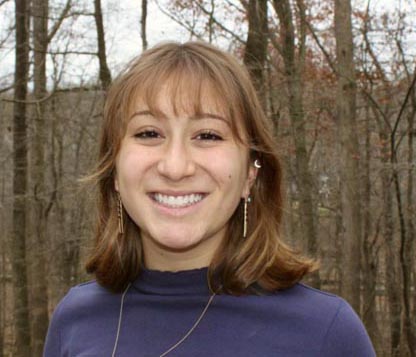 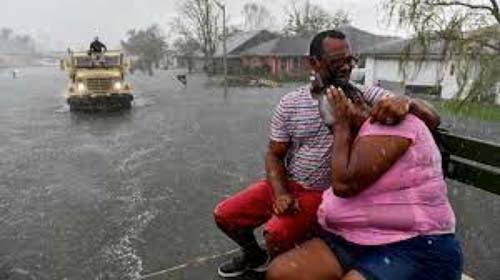 On August 25, Hurricane Ida, a Category 4 hurricane, whipped through Louisiana. Though Ida was the one of the strongest to hit the Gulf Coast, it was not just the storm that was responsible for the suffering Louisianans would incur in the coming weeks and months. The day after the storm, Louisiana’s leading utility company, Entergy,left 1 million homes without power across the state—including the entirety of New Orleans. On August 25, Hurricane Ida, a Category 4 hurricane, whipped through Louisiana. Though Ida was the one of the strongest to hit the Gulf Coast, it was not just the storm that was responsible for the suffering Louisianans would incur in the coming weeks and months. The day after the storm, Louisiana’s leading utility company, Entergy,left 1 million homes without power across the state—including the entirety of New Orleans. Power would not be restored in New Orleans for two weeks after the storm. As of Sept 29, one month after the storm, 5,000 Entergy customers were still waiting for lights to come back on. In areas that Entergy swore the power had been restored to, residents begged to differ—many still couldn’t use their electricity. In response to those pleas, Entergy conceded that although power may be flowing through the grid in those areas, homes and buildings still may not have access to that power due to further structural damage—and the owners of those buildings are responsible for repairs before they can have electricity again! Read more | | | | | | The Wind Beneath Biden’s Wings: Climate Goals Need Wind Energy,
Can It Fly?   Without a doubt, the US is about to see a surge in wind energy. Even the Texas panhandle is dotted with turbines. And plans for new wind farms have sped through federal and state approval processes in half a dozen coastal states with ambitious renewable energy targets to hit. But just a few years ago, even wind energy advocates could not have predicted such a boom. How did we get here, and what obstacles might wind energy face now? Without a doubt, the US is about to see a surge in wind energy. Even the Texas panhandle is dotted with turbines. And plans for new wind farms have sped through federal and state approval processes in half a dozen coastal states with ambitious renewable energy targets to hit. But just a few years ago, even wind energy advocates could not have predicted such a boom. How did we get here, and what obstacles might wind energy face now? 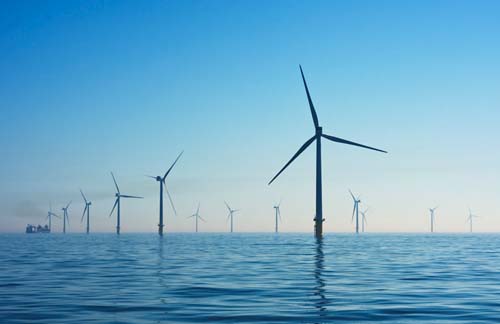 Heading into the critical Glasgow climate conference (COP26), the Biden Administration flaunted every small step it made toward climate change mitigation. John Kerry returned from his world tour of climate diplomacy to proclaim that the world is “behind” on its climate commitments. But he could have stayed home and still come to that conclusion after examining the continued American reliance on fossil fuels and the ceaseless battles with congressional conservatives and fossil fuel promoters over renewable energy development. But the hope shining from out of these stormy, polluted clouds has been the possibility of vastly expanded wind energy. From coast to coast, offshore wind energy has dominated the policy and media landscapes as many Governors and the President alike have proclaimed new offshore wind energy targets to cut greenhouse gas (GHG) emissions and create renewable energy jobs. The overwhelming message from climate scientists, environmental advocates, and democratic leaders alike is that the US needs offshore wind energy and fast. So where does the U.S. stand with GHG emissions targets and offshore wind now? Read more Heading into the critical Glasgow climate conference (COP26), the Biden Administration flaunted every small step it made toward climate change mitigation. John Kerry returned from his world tour of climate diplomacy to proclaim that the world is “behind” on its climate commitments. But he could have stayed home and still come to that conclusion after examining the continued American reliance on fossil fuels and the ceaseless battles with congressional conservatives and fossil fuel promoters over renewable energy development. But the hope shining from out of these stormy, polluted clouds has been the possibility of vastly expanded wind energy. From coast to coast, offshore wind energy has dominated the policy and media landscapes as many Governors and the President alike have proclaimed new offshore wind energy targets to cut greenhouse gas (GHG) emissions and create renewable energy jobs. The overwhelming message from climate scientists, environmental advocates, and democratic leaders alike is that the US needs offshore wind energy and fast. So where does the U.S. stand with GHG emissions targets and offshore wind now? Read more | | | | | | More Than 400 Toxic Sites in California Are at Risk of Flooding From Sea Level Rise When Lucas Zucker talks about sea level rise in California, his first thoughts aren’t about waves crashing onto fancy homes in Orange County, nor the state’s most iconic beaches shrinking year after year. What worries him most are the three power plants looming over the Oxnard coast, and the toxic waste site that has languished there for decades. There are also two naval bases, unknown military dumps and a smog-spewing port. Just one flood could unleash a flow of industrial chemicals and overwhelm his working-class, mostly Latino community. | | | | | | Haskell Indian Nations Professor Fights Climate Change Through Indigenous Land Ethic The culture at Navajo Technical University in the deserts of New Mexico feels different from that of the College of Menominee Nation, nestled among the Great Lakes in Wisconsin, or from Haskell Indian Nations University, located on the Great Plains in eastern Kansas, where Dr. Daniel Wildcat is a professor. The reason for this, Wildcat says, is attributed to the power of place. | | | | | | A Freeway RIpped the Heart Out of Black life in Detroit. Now Michigan Wants to Tear it Down. Highway removal is the easy part. Making reparations is where it gets complicated. In 1945 in Detroit, Michigan, a man who is believed to be the first African-American independent record producer opened up a blues and gospel record store called Joe’s Record Shop. The store was lined with vinyl records and music posters, with a big, upright piano in the back. Joe Von Battle started the business by selling records from his personal collection. | | | | | | What Happens When Communities and Academics Teach Each Other? "Communiversity." Dismayed by the “repulsive and immoral” way academia often collaborates with frontline communities, environmental justice leader Beverly Wright pioneered an innovative, equitable approach. Before she was a towering figure in the environmental justice movement, Beverly Wright, who has a doctorate in sociology, was an associate professor at Wake Forest University. While on sabbatical in her hometown of New Orleans in 1992, she was asked by a group of environmental justice advocates to lead a program at Xavier University of Louisiana that would bring academics and communities together to solve problems. | | | | | | | | OPINION: Fighting For the Climate Means Upholding Indigenous Sovereignty 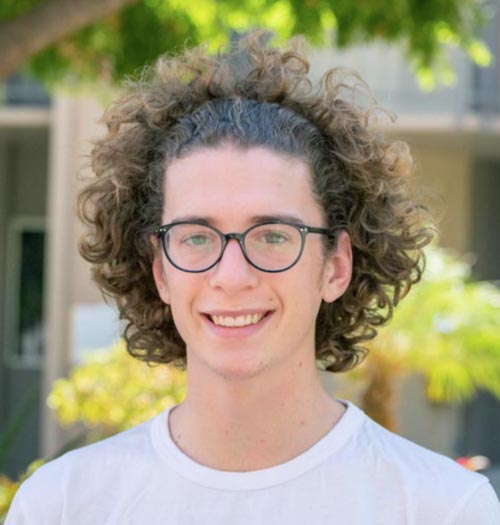 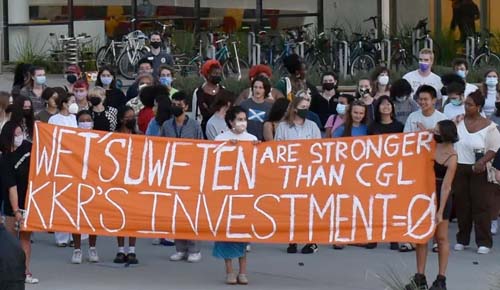 Indigenous Wet’suwet’en water defenders are currently occupying their sovereign territory in British Columbia, Canada to resist construction of the illegal Coastal Gaslink Pipeline. Despite many attempts at invasion by the Royal Canadian Mounted Police (RCMP), the Wet’suwet’en have continued to protect their land. Last year, the RCMP made a military-style raid on the unceded territory, arresting matriarchs while they performed a ceremony to honor missing and murdered Indigenous women and girls. More recently, the RCMP made an assault on the Gidimt’en Checkpoint where they violently removed a protester attached to a blockade to protect the sacred headwaters of the Wet’suwet’en. Indigenous Wet’suwet’en water defenders are currently occupying their sovereign territory in British Columbia, Canada to resist construction of the illegal Coastal Gaslink Pipeline. Despite many attempts at invasion by the Royal Canadian Mounted Police (RCMP), the Wet’suwet’en have continued to protect their land. Last year, the RCMP made a military-style raid on the unceded territory, arresting matriarchs while they performed a ceremony to honor missing and murdered Indigenous women and girls. More recently, the RCMP made an assault on the Gidimt’en Checkpoint where they violently removed a protester attached to a blockade to protect the sacred headwaters of the Wet’suwet’en. Simultaneously, Indigeous Yaquì people in the town of Loma de Bàcum in Sonora, Mexico face wrongful imprisonment, kidnapping and murder. This violence is directly tied to the construction of the Sonoran Pipeline, a liquid natural gas pipeline being pushed through Loma de Bàcum without prior, free or informed consent of the communities. Despite both these communities having title to their land, states and corporations are conspiring to exploit their land for short-term profit. These stories are not unique. Indigenous communities all over the world are experiencing violence related to the extraction and transportation of natural resources. Read more | | | | | | The Consequences of Nature Deficit in Urban Spaces  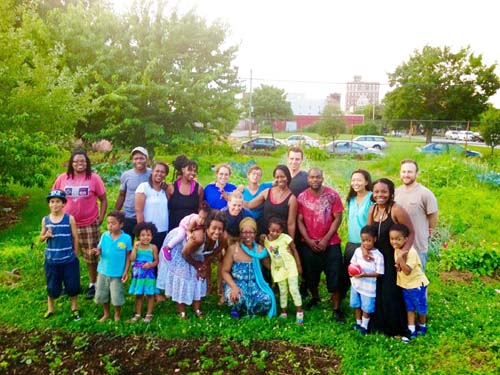 Often, the older generation chastises young children for constantly being stuck indoors. Dubbed “iPad kids,” the children of today are seldom depicted in an outdoor setting and instead, are seen glued to their electronics. But is a lack of nature truly affecting modern-day children and even adults? Often, the older generation chastises young children for constantly being stuck indoors. Dubbed “iPad kids,” the children of today are seldom depicted in an outdoor setting and instead, are seen glued to their electronics. But is a lack of nature truly affecting modern-day children and even adults?
The concept of “Nature Deficit Disorder” may help us explain the effects of isolation from nature on children and adults. Coined in 2005 by Richard Louv in his book, Last Child in the Woods, Louv argues that more time spent indoors is directly correlated to an increase in mental and physical ailments. While he argues that this mainly affects children, adults are not immune from the consequences of an increasingly indoor lifestyle. It is not a medical condition, but more a description of the consequences of human alienation from nature. Read more | | | | | | Students Not Backing Down as UMaine Board Refuses to Fully Divest From Fossil Fuels Amid a worsening climate crisis, University of Maine students are putting pressure on the institution to fully divest from fossil fuels, which leaders of the UMaine system have so far declined to do. Dozens of students gathered Nov. 12 for a climate strike, according to a news release from the student-led group Divest UMS, which has spearheaded the effort to get the university system to remove about $14 million in assets from fossil fuel interests. Students then held a “die-in” during a Monday meeting of the system’s Board of Trustees. | | | | | | Case Western Reserve University Divests from Fossil Fuels What Does Interim President Scott Cowen have to say? "First, however, some context. In 2017, the university ceased additional investments in fossil fuel companies and in funds where fossil fuels are part of the investment mix. More recently, we launched a portfolio focused on ESG investments—that is, companies and funds where policies and practices reflect concern for our environment and social responsibility, and also demonstrate governance practices that advance ethical behavior among leaders (for example, avoiding conflicts of interest) as well as the organization as a whole. | | | | | | St. Thomas Commits to Divesting From Fossil Fuels Heeding recent calls from the Catholic Church for faith-based institutions to fight a growing ecological crisis, St. Thomas’ Board of Trustees formally approved on Nov. 4 a university commitment to divest from fossil fuels. The commitment officially marks St. Thomas joining a global movement of Catholic institutions that are divesting from fossil fuels in an effort to bring Pope Francis’ encyclical letter – Laudato Si’: On Care for Our Common Home – to life. St. Thomas, which recently committed to participate in the Vatican’s new Laudato Si’ Action Platform, is currently working to achieve carbon neutrality by 2035 as part of its latest five-year strategic plan. | | | | | | University of Toronto to Divest From Fossil Fuel Investments, Create Climate-positive Campus The University of Toronto is committing to divest from investments in fossil fuel companies in its $4.0-billion endowment fund beginning immediately.As part of a suite of sustainability measures announced by U of T President Meric Gertler today, the University of Toronto Asset Management Corporation (UTAM) – U of T’s investment manager – will divest from all direct investments in fossil fuel companies within the next 12 months, and divest from indirect investments, typically held through pooled and commingled investment vehicles, by no later than 2030, and sooner if possible. | | | | | | Mayor Wu Signs Boston Fossil Fuel Divestment Ordinance Mayor Michelle Wu signed an ordinance Monday to divest $65 million in city investments from companies that profit off fossil fuels. The new ordinance prohibits city funds from being invested in the stocks, securities, or other obligations of any company which derives more than 15% of its revenue from fossil fuels, tobacco products, or prison facilities. The policy does not apply to the city's pension fund, which is governed by state laws. | | | | | | | | Environmental Education Outside the Classroom:
The Campus as Haven for Environmental Learning   When I was small, I would spend hours roaming about the woods like a mouse. Or scurrying like a fox, hunting for small creatures just under thick leaf litter. Quickly, I learned to avoid the heavy-trod paths of hunters and, more imperatively, the loggers and trucks that would leave what seemed to be endless expanses of torn land where the sun quickly bleached any remnants of plant life. As people surrendered more and more of their land for clearing, my forested realms dwindled into islands. When I was small, I would spend hours roaming about the woods like a mouse. Or scurrying like a fox, hunting for small creatures just under thick leaf litter. Quickly, I learned to avoid the heavy-trod paths of hunters and, more imperatively, the loggers and trucks that would leave what seemed to be endless expanses of torn land where the sun quickly bleached any remnants of plant life. As people surrendered more and more of their land for clearing, my forested realms dwindled into islands.
I found my backyard an island. Not only did it provide a sanctuary for me, but it acted as a refuge for passing and resident wildlife that sought shelter from the development and logging disrupting their homes. Converting whatever spaces I could into habitat and feeding grounds enticed even the shyest of creatures to visit. This concentrated exposure to nature furnished my first taste of environmental education and solidified my connection to the world around me. Read more | | Edit this section of copy to tell your supporters how their action will help ignite change. Use stories, quotes, data, and other inspiring content to capture their attention and get them to act. | | | | | | | | As our partners on campus know, preparing the next generation of environmental leaders is critical to our efforts to prepare for climate change and address our critical sustainability problems. In this report from the National Wildlife Federation, researchers make the case for increased efforts in climate education to meet our national emissions goals. 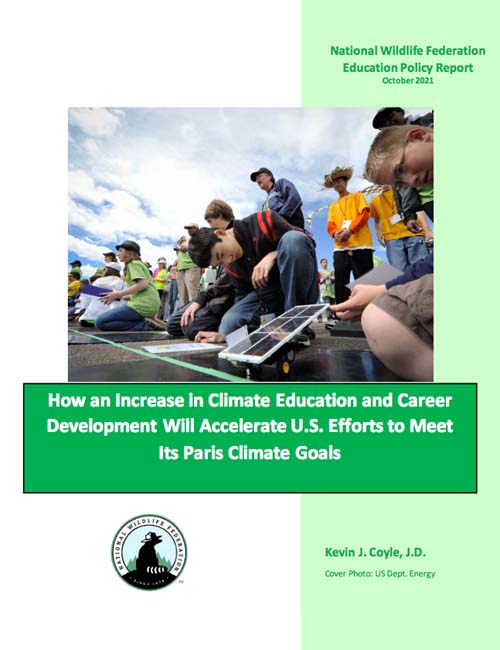 How an Increase in Climate Education and Career Development Will Accelerate U.S. Efforts to Meet Its Paris Climate Goals: The Case for Investing in Nationwide Climate Literacy How an Increase in Climate Education and Career Development Will Accelerate U.S. Efforts to Meet Its Paris Climate Goals: The Case for Investing in Nationwide Climate Literacy
What happens when you put climate and justice leaders in a room with their greatest mentor? Deep, inspiring conversations on what mentorship means, on the power of relationships, and on what it takes to sustain a passion for changing the world. For the second season of Fix’s Temperature Check podcast, we asked six climate leaders to tell us their greatest mentors — the people whose influence and guidance have impacted what they do and why they do it. Then we invited the pairs to come together and discuss their relationship — to the work and to each other.  What happens when you put climate and justice leaders in a room with their greatest mentor? Deep, inspiring conversations on what mentorship means, on the power of relationships, and on what it takes to sustain a passion for changing the world. For the second season of Fix’s Temperature Check podcast, we asked six climate leaders to tell us their greatest mentors — the people whose influence and guidance have impacted what they do and why they do it. Then we invited the pairs to come together and discuss their relationship — to the work and to each other. (Learn more.) What happens when you put climate and justice leaders in a room with their greatest mentor? Deep, inspiring conversations on what mentorship means, on the power of relationships, and on what it takes to sustain a passion for changing the world. For the second season of Fix’s Temperature Check podcast, we asked six climate leaders to tell us their greatest mentors — the people whose influence and guidance have impacted what they do and why they do it. Then we invited the pairs to come together and discuss their relationship — to the work and to each other. (Learn more.) This audio story is part of Fix’s Mentorship Issue exploring the unique ways climate leaders found their calling, and how new approaches to mentorship are upending old power structures. Check out the full issue here. | | | | | | | | Plan Your 2021-2022 Campus Events with RCC now! 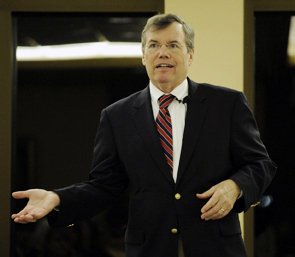 For the first time in over a year, RCC President & CEO, Dr. Robert K. Musil, a national leader in climate change, environmental justice and health is again available to book for in-person campus speaking events! Musil has been called “informative, challenging and inspirational all at once.” He is “motivational” with “intellectual depth” and “extraordinary impact.” For the first time in over a year, RCC President & CEO, Dr. Robert K. Musil, a national leader in climate change, environmental justice and health is again available to book for in-person campus speaking events! Musil has been called “informative, challenging and inspirational all at once.” He is “motivational” with “intellectual depth” and “extraordinary impact.”
Dr. Musil is available for campus lectures and visits involving classes, meetings with campus and community groups, consultations with faculty and administrators, or for Earth Day, Commencement, and other special events. Stays range from one to three days. Reduced fees are in place for 2021-2022 and can be designed to meet reduced budgets. To arrange a campus visit with Dr. Musil, contact the RCC President’s Office at office@rachelcarsoncouncil.org or call 301-214-2400. Dr. Musil is also available to CIC members (Council of Independent Colleges) as a CIC Visiting Fellow (formerly Woodrow Wilson) for stays of a week through the CIC Visiting Fellows Program here.  The RCC also offers talks, classes, and workshops on student engagement, activism, sustainability, and the RCC Fellowship program with Associate Director Mackay Pierce. The RCC also offers talks, classes, and workshops on student engagement, activism, sustainability, and the RCC Fellowship program with Associate Director Mackay Pierce.
To arrange a visit, contact our Associate Director Mackay Pierce at: mackay@rachelcarsoncouncil.org | | | | | |  The Rachel Carson Council Depends on Tax-deductible Gifts From Concerned Individuals Like You. Please Help If You can. The Rachel Carson Council Depends on Tax-deductible Gifts From Concerned Individuals Like You. Please Help If You can. | | | |  Sign Up Here to Receive the RCC E-News and Other RCC Newsletters, Information and Alerts. Sign Up Here to Receive the RCC E-News and Other RCC Newsletters, Information and Alerts. | | | | | | | | | | | |